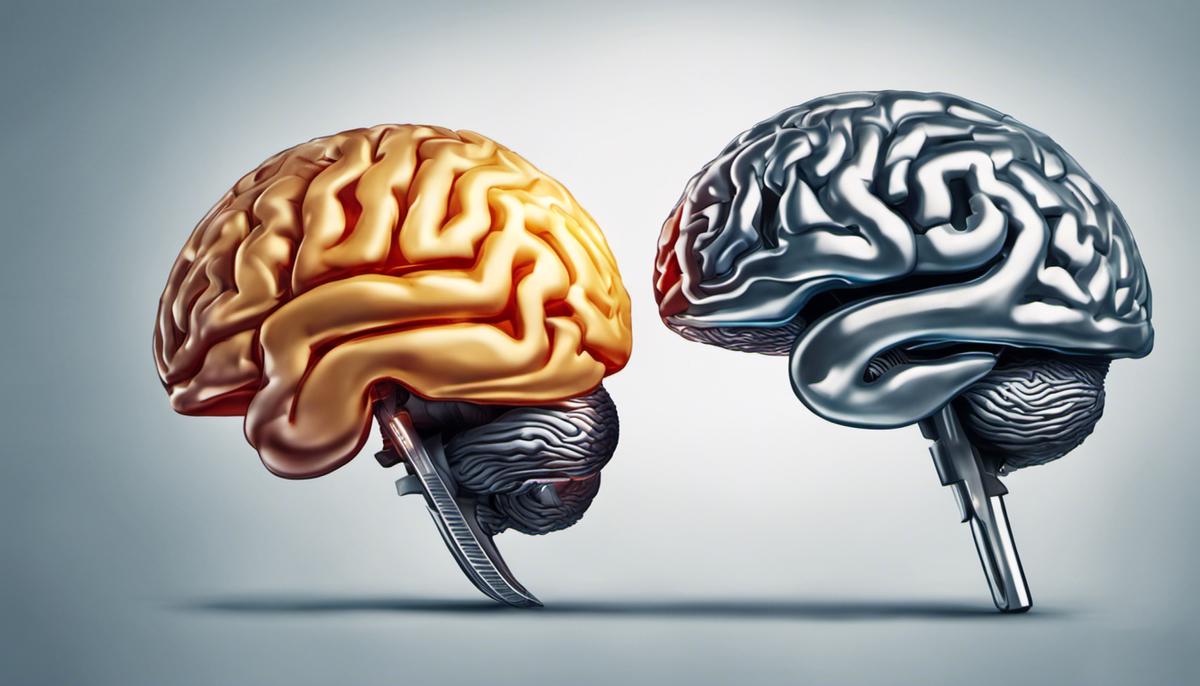Our mindset, the lens through which we view our self and our world, significantly defines us. The mindsets we cultivate have profound implications on our behavior, goals, and overall life perspective, much more than we often realize. With recent scientific developments, the theory of mindsets has gained considerable attention as it holds the potential of transforming our lives. We now understand that our mindsets are not static; they can be shaped and developed. This exploration will delve deep into the fascinating world of mindsets, exploring the distinctions between ‘Fixed’ and ‘Growth’ mindset, how neuroplasticity plays into it, the role it plays in success and achievement, and how we can consciously cultivate a growth mindset. Additionally, it will offer insights into how our mindset impacts different areas of our lives, from education and careers to relationships and personal growth.
Understanding Mindset
Understanding Mindset: The psychological framework that shapes behavior and goals
Mindset refers to a set of beliefs or a way of thinking that determines one’s behavior, outlook, and mental attitude. It is essentially the collection of thoughts and beliefs that shape one’s thought habits, and those thought habits affect how one thinks, what one feels, and what one does. It’s a mental inclination or disposition, or a frame of mind. It’s the lens through which we interpret the world, and it powerfully influences how we interact with others and our pursuit of success and fulfillment.
The Power of Mindset: Influence on behavior, goals, and life perspective
Mindsets can significantly impact various aspects of life. A mindset affects how we approach challenges and setbacks, influencing our resilience and determination. It impacts how we view ourselves and our abilities, shaping our self-esteem and confidence. It also significantly impacts our relationships, work, and life satisfaction. A growth mindset, for example, where people believe their abilities and intelligence can be developed, often leads to greater success and fulfillment.
Types of Mindsets: Fixed versus Growth
Many psychologists divide mindset into two main types: fixed and growth. Fixed mindset individuals believe their basic qualities, like intelligence or talent, are fixed traits. They spend their time documenting their intelligence or talent instead of developing them, they also believe that talent alone leads to success.
On the other hand, a growth mindset thrives on challenge and sees failure not as evidence of unintelligence but as a springboard for growth and for stretching existing abilities. Individuals with this type of mindset believe that they can develop their basic qualities through dedication and hard work. Brains and talent are just the starting point for them.
These mindsets lay foundations for different behaviors. People with fixed mindsets tend to avoid challenges, give up easily, see effort as fruitless, ignore useful negative feedback, and feel threatened by others’ success. In stark contrast, individuals with growth mindsets embrace challenges, persist in the face of setbacks, see effort as a path to mastery, learn from criticism, and find inspiration in others’ success.
Formation of Mindsets: The underlying influences
The formation of a mindset can result from various influences, including genetic traits, environmental factors, and personal experiences. Cultural context, educator expectations, parental influence, feedback from others, personal experiences, learning experiences, and history of success or failure – all can contribute to mindset formation.
Regarding mindset change, it’s not a quick or easy process, but according to modern psychologists, one can shift from a fixed to a growth mindset with conscious effort and practice. Changes may involve self-reflection, education, therapy, training, and other structured programs.
The Role of Mindset in Daily Life
In navigating the various aspects of life, the importance of understanding the concept of mindset and its influence on self-perception and behavior cannot be overstated. The application of this understanding cuts across different spheres – within educational settings, nurturing a ‘growth mindset’ among students has been linked with enhanced motivation, higher grades, and better overall student outcomes. Similarly, in professional environments, having a ‘growth mindset’ can lead to improved employee engagement, increased productivity, foster innovation, and consequently the growth of the business. Moreover, understanding that change is not only inevitable but beneficial, instills resilience and better coping mechanisms when faced with life’s challenges, thus improving overall mental health and emotional wellbeing.

Fixed Mindset vs Growth Mindset
The Dichotomy of Mindsets: Fixed Versus Growth
Without a doubt, the type of mindset we adopt has a profound impact on how we perceive, interpret, and respond to our environment. Seminal psychological research delineates the existence of two primary types of mindsets: a ‘fixed mindset’ and a ‘growth mindset’.
Individuals with a ‘fixed mindset’ regard qualities such as intelligence or talent, as immutable traits – essentially something that cannot be significantly improved upon. On the other hand, individuals with a ‘growth mindset’ perceive these attributes as malleable, able to be honed and developed through consistent effort and learning. As such, a fixed mindset often leads to stagnation, creating barriers to personal development, as it discourages individuals from seeking out opportunities for growth. Conversely, a growth mindset promotes a culture of continuous self-improvement, encouraging individuals to relentlessly strive for betterment.
Impact on Achievement and Learning Outcomes
Fixed and growth mindsets influence how individuals perceive and react to challenges and obstacles. Those with a fixed mindset often perceive setbacks as insurmountable, leading to resignation and decreasing the likelihood of accomplishment. In contrast, however, those with a growth mindset view hurdles as opportunities for learning and growth. They perceive effort as a necessary process to enhance their skills or knowledge, hence improving their chances of success in the long run.
The impact of these two mindsets also extends to the realm of learning. The growth mindset fosters a love for learning, seeing knowledge as something to be gained, not merely something to be measured. On the other hand, the fixed mindset often views learning as a performance or an evaluation, focusing on appearing intelligent rather than stimulating intellectual growth.
The Concept of Neuroplasticity
The impact and importance of growth mindset are further supported by the concept of neuroplasticity, which asserts that the brain is not a rigid organ but rather a flexible one capable of learning and adapting. Neuroplasticity refers to the brain’s ability to change throughout an individual’s life, promoting the development of new neural pathways, increasing one’s knowledge, skillset, and overall cognitive abilities.
This aspect of neuroscience offers significant support for the growth mindset. Demonstrating that abilities and intelligence are not fixed aspects of an individual’s psyche, it fundamentally contests the fixed mindset ideology. Neuroplasticity underscores the fluid nature of our cognitive abilities and the potential for continuous learning and growth.
Understanding and adopting a growth mindset is of significant importance due to the scientific evidence highlighting the brain’s flexibility and capacity for change through learning and experience. The existing relation between mindset and achievement, development, and learning process underscores the necessity of nurturing a growth mindset for succeeding in personal and professional life.

The Role of Mindset in Success & Achievement
The Influence of Mindset on Success and Personal Attainment
Mindset essentially refers to an individual’s beliefs about their capabilities and potential, influencing personal actions, relationships, and even health. Noted psychologist Carol Dweck categorizes mindset into two distinct types – a fixed mindset and a growth mindset.
While a person with a fixed mindset conceives that their abilities are inherent and unchanging, an individual with a growth mindset perceives a scope for the development and enhancement of their abilities. The mindset type one adheres to significantly affects how an individual tackles obstacles, recovers from failures, and ultimately, perceives their success.
Case Studies and Research
Case studies and various research over the years have consistently highlighted the profound effect mindsets can have on an individual’s success and performance. In one notable experiment in a school environment, students who were praised for their effort rather than their innate ability (reflecting a growth mindset) showed an increase in motivation and improvement in grades.
Moreover, a well-known meta-analysis of 113 studies, with a collective sample size of 20,241 participants, found that holding a growth mindset is associated with better academic achievement as well as the perseverance to tackle challenging tasks.
Mindset and Performance
Research suggests that having a growth mindset can lead to not only increased effort and motivation but also higher resiliency in the face of adversity. This mindset encourages embracing challenges, persisting through setbacks, and viewing failures as opportunities for learning, all of which are critical for achieving success in any area of life.
In the business world, companies fostering a growth mindset have been found to have happier, motivated workforces, and as a result, better productivity and efficiency. For instance, in a study at a Fortune 1000 company, employees who possessed a growth mindset were reported to be 47% more likely to say that their colleagues were trustworthy.
Mindset is also influential in sports performance. For athletes, a growth mindset can help them overcome setbacks, learn from their mistakes, and improve their performance. An investigation into the British cycling team, renowned for its phenomenal success on the international stage, revealed a deep-rooted culture of a growth mindset within the team, where failures were seen as opportunities for improvement rather than dead-ends.
Reprogramming the Mindset
The transformative power of a growth mindset can revolutionize an individual’s potential for achievement. However, adopting a growth mindset is not an overnight process. It involves understanding that talent can be nurtured, and skills can be mastered with consistent practice and effort. It also involves reprogramming long-held beliefs about self-worth and success, challenging self-defeating thoughts, and replacing them with positive affirmations focused on growth and development.
Mindset holds the power to shape our lives and dictate our success. The research underscores the importance of fostering a growth mindset for individual development, achievement, and overall performance.
In all spheres of life, including academics, professionalism, and personal journeys, fostering a growth mindset can drastically improve one’s ability to tackle difficulties, gain insights from them, and stride progressively towards fulfilling one’s aspirations.

Implementing a Growth Mindset
Navigating Through The Types Of Mindset
Two fundamental mindsets govern how we perceive and respond to challenges, setbacks, and successes: The Fixed Mindset and the Growth Mindset. Individuals embracing a Fixed Mindset presume that their talents, intellect, and competencies are innate and unalterable. This outlook often leads them to circumvent challenges since they fear that failures could label them. They also often disregard efforts as unavailing, convinced that inborn talent is the one and only element of triumph.
Conversely, those cherishing a Growth Mindset are of the belief that their aptitudes and intellect can be nurtured and expanded through persistence and industriousness. They apprehend that while talent forms an advantageous initial point, it doesn’t suffice for monumental success. Challenges for them are enthusiastically welcomed, failures are perceived as teaching opportunities, and they firmly believe that ceaseless effort is a requisition on the journey towards excellence and attainment.
Transitioning from a Fixed Mindset to a Growth Mindset
The shift from a fixed mindset to a growth mindset requires deliberate practice and continual reinforcement. Here are some strategies that can help with this mindset shift.
Mindfulness
Mindfulness involves being fully present in your experiences, deliberately attending to what’s happening in and around you. You can cultivate mindfulness through practices such as meditation and mindfulness exercises. By fostering mindfulness, you can better identify when you’re falling into a fixed mindset and choose to redirect your thoughts towards growth.
Self-Awareness
Self-awareness plays a crucial role in fostering a growth mindset. Start by identifying which areas in your life reflect a fixed mindset. This could be anything, from work to relationships to health habits. Once you’ve identified these areas, make an active effort to approach them with a growth mindset, see challenges as learning opportunities, and understand that abilities, talents, and intelligence are not fixed.
Embrace Challenges
People with a growth mindset view challenges as opportunities to learn and grow, rather than threats or insurmountable obstacles. Start by taking on smaller challenges in areas you want to develop, and gradually increase the difficulty as you feel more comfortable. Embracing challenges in this way can reinforce your belief in your ability to learn and develop.
Reframing Failure
Reframing failure is also crucial in shifting a mindset. People with a growth mindset view failure not as an indication of personal deficiencies, but as an opportunity for development and learning by refining processes or re-strategizing. They embrace failure as part of the journey to success.
Practice Patience and Persistence
The transition from a fixed mindset to a growth mindset won’t happen overnight. It requires patience and persistence. You’ll need to continually remind yourself that ability and intelligence can be developed through hard work and determination. It’s important to stay patient with yourself throughout this process, as shifting mindset takes time, and you may not see the results immediately.
Developing a Growth Mindset
Developing a growth mindset involves numerous strategies. These include recording your thoughts to track growth, prioritizing effort over the end result, defining learning objectives rather than just performance goals, and frequently engaging with affirmations that support the growth mindset concept.

Photo by karthik_sreenivas on Unsplash
The Impact of Mindset in Different Life Aspects
The Impact of Mindset in Education
The type of mindset we have can greatly influence education, shaping how students perceive their abilities, respond to difficulties, and view failure. Embracing a growth mindset, which is the understanding that intelligence and skills can be cultivated through sincere effort, leads to greater academic success and motivation among students. This mindset promotes resilience in the face of setbacks, allowing students to focus on learning as opposed to just performance outcomes. Conversely, those with a fixed mindset – the belief that intelligence and talents are unalterable – may develop a fear of failure or avoid daunting tasks, which can in turn obstruct their academic growth and progress.
Mindset and Relationships
In relationships, mindset impacts how individuals interpret and respond to their partner’s behaviors, handle conflicts, and deal with relationship challenges. Those with a growth mindset tend to view relationship problems as hurdles that can be overcome through effort and are generally more open to altering their behaviors for healthier relationship dynamics. On the other hand, people holding a fixed mindset may view relationship issues as inherent and unchangeable, leading to more strained relationships.
Mindset and Career
Your mindset can significantly influence career success. Individuals with a growth mindset are more likely to engage in goal-oriented behaviors, persist in the face of setbacks, and embrace learning opportunities, all of which can lead to career advancement. Additionally, a growth mindset fosters innovative thinking, as individuals are more willing to take intellectual risks and explore new strategies. However, those with a fixed mindset may shy away from challenges, limit their potential, and feel threatened by the success of others.
Mindset and Personal Growth
Mindset is a key driver of personal growth. Individuals with a growth mindset view life as a continuous learning journey and are more likely to invest in self-development activities. They regard failures and setbacks as learning opportunities instead of defining moments. This mindset cultivates resilience, adaptability, and an undeterred pursuit of personal goals. However, individuals with a fixed mindset often miss out on growth opportunities as they tend to avoid situations that challenge their assumed capabilities.
Using Mindset to Improve Life
Understanding the impact of mindset provides the knowledge tool to apply it towards improving one’s life. Cultivating a growth mindset involves recognizing that abilities and intelligence can be developed and that effort is a crucial part of this process. By embracing challenges, persisting in the face of setbacks, accepting criticism constructively, and seeing the success of others as inspiration, individuals can leverage the power of growth mindset to enhance their education, relationships, career, and personal growth. Additionally, changing one’s mindset is a lifelong journey that requires continuous introspection, learning, and growth.

As we have explored, the kind of mindset we cultivate has far-flung effects on our overall life trajectory. The growth mindset, with its emphasis on learning, embracing challenges, and viewing failures as opportunities rather than setbacks opens the door for continuous personal and professional development. On the other hand, remaining trapped in a fixed mindset can limit our potential and hinder our progress. Our mindset significantly contributes to our outlook on life, informs our performance, and even our ability to form and sustain relationships. Taking deliberate steps to nurture a growth-oriented view of our abilities can yield meaningful changes in all facets of life we endeavor. Indeed, a well-grounded shift towards a growth mindset could be the most rewarding investment in oneself.



